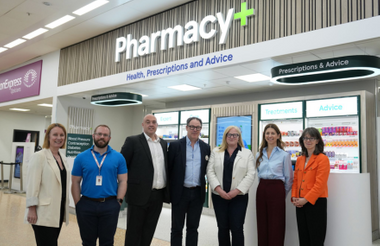A cross-sector partnership between three health charities and one of the UK’s biggest retailers has been voted the most admired partnership for the third consecutive year.
Business and society consultancy C&E Advisory published its annual Corporate–Non-profit Partnerships Barometer 2025, which draws on the experience of 130 corporate and not-for-profit respondents, today.
The report reveals that the Tesco-Cancer Research UK (CRUK)-British Heart Foundation (BHF)-Diabetes UK health partnership was voted the most admired partnership by peers.
It also finds that moderate use of artificial intelligence (AI) is rising, with over a quarter of not-for-profits reporting some use, while the reduction in Official Development Assistance (ODA) funding is creating pressure for many respondents.
Most admired partnership
The multilateral partnership between Tesco, CRUK, BHF and Diabetes UK secured 6.9% of the vote in an unprompted poll of sector leaders, and was recognised for its long-term commitment to health awareness and fundraising.
Launched in 2018, the partnership brings together the skills and expertise of the charities and Tesco to help tackle the UK’s biggest health challenges facing the UK. Since its launch, it has delivered health insights and interventions and raised over £34m for the charities.
The Sky Bet–BHF partnership, which launched in May, was voted runner-up, “reflecting strong appreciation for its national reach and public engagement” and securing 5.6% of the vote.
It was followed by the Tesco–WWF and HSBC–Shelter partnerships, which both secured 4.2% and jointly took third place.
Not-for-profit respondents said access to funding remained the key motivator for partnering, followed by long-term stability and impact and access to people and contacts.
Conversely, corporates cited reputation and credibility as a key driver, followed by innovation and long-term stability and impact.
“There’s also strong agreement (68% of corporate and 61% of non-profit respondents agree) that cross-sector partnering has helped businesses to change their practices for the better,” the report reads.
“This is an important finding about the value of cross-sector collaboration, but we find this year a 10% decline in the proportion of businesses acknowledging that their organisations have changed behaviour for the better, owing to cross-sector partnering.”
Impact of ODA cuts
Some not-for-profit respondents said government cuts to ODA were creating an added strain for them, with just under a third reporting negative impacts on their environmental, social and governance efforts.
Meanwhile, nearly one in five described the impact of the ODA cuts “as significantly negative”, with some citing cancelled programmes or structural changes.
“Despite these constraints, most organisations haven’t reduced their investment in partnerships,” the report says.
“94% of corporates and 64% of non-profits report no change. Meanwhile, 25% of non-profits say they’re now investing more in cross-sector collaboration.
“The figures suggest a cautious but proactive pivot towards partnerships to offset funding gaps and maintain delivery.”
One not-for-profit respondent said: “It [cuts in ODA funding] has cut three major programmes, primarily on the African continent and Middle East. This accounted for 25% of our budget.”
Another commented: “The drop in income from ODA has already caused us to stop life-saving programmes. We’re planning for a very different future.”
The report says a quarter of not-for-profits “have already increased their partnering investments, potentially signalling a strategic pivot, diversifying towards or enhancing collaboration in response to tightening resource constraints”.
Increase in moderate AI use
Several not-for-profit respondents said they were using AI in partnerships, with expectations of significant future impact.
Moderate use increased year-on-year, with over a quarter of not-for-profits reporting AI featured to some extent, “bringing total corporate adoption to 50% (up from just 11% in 2024)”.
The report says that while corporates have accelerated their adoption of AI, uptake among not-for-profit organisations “remains more limited, reflecting a different pace of engagement and contrasting with the more enthusiastic uptake seen among corporate partners”.
Collectively, most respondents said they anticipated AI playing an important role in research, partnership impact and reporting, programme delivery, partner selection, and policy and advocacy in the coming three years.
Related articles











